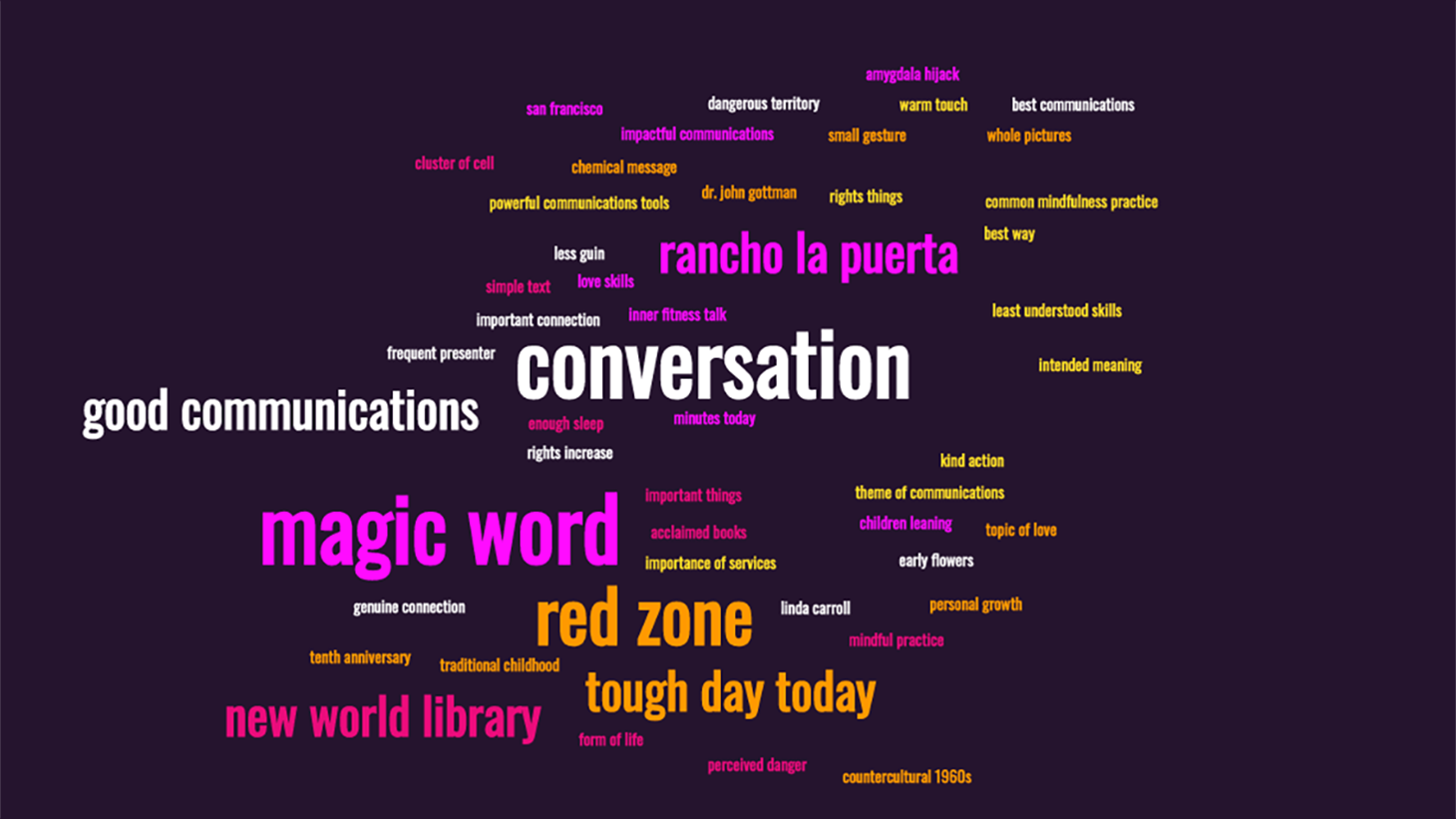Communication Surprises

As a relationship author and family therapist for nearly 40 years, I can boil all I know about our most important connections down to this: love is a feeling, and loving is a skill set. Some of the least understood skills revolve around the theme of communication.
In the following, I share three of the most essential facts about communication that, once understood, can change your relationships forever.
Beware of Communicating in the Red Zone
Most communication issues stem from stress. In my Inner Fitness talks at Rancho La Puerta, I refer to this as “communicating in the red zone.” When our bodies sense danger, our brains trigger chemical messages. We go from being reasonable, rational, and generous to wanting to fight, flight, freeze, or fold. This response is also referred to as an amygdala hijack.
The amygdala is a cluster of cells located near the base of the brain, and it sends signals when there is perceived danger. These signals flood our bodies with stress hormones, trying to help us survive by fighting or fleeing (fight or flight). If a saber-toothed tiger is chasing us, this reaction can be helpful, but it has the opposite effect when a loved one expresses they are upset with us. The amygdala does not know the difference between criticism and a growling tiger, and both can be considered equally threatening. In this fight or flight zone, we lose our ability to see the whole picture, our certainty that we are right increases, and our empathy for others disappears.
At spiritual retreats, it is a common mindfulness practice for participants to stop what they are doing when they hear a bell ring and turn inwards at unexpected times throughout the day. This helps them become still enough to take a breath and check-in with their wise and centered selves rather than giving in to their first reaction.
Using this mindful practice in our regular lives is one of the best things we can do for ourselves and those we love. When we recognize that we are in the red zone in a conversation, it helps us calm down enough to move away from dangerous territory. It gives us time to choose how to respond.
Three Magic Words
We often equate the expression “three magic words” with “I love you.” But some phrases can allow you to discover important things about your partner (and others). These words will help those you love feel cared about and seen and want to respond to you in kind.
Good communication is often perceived as the need to say the right thing in the best way so that the other person can understand our intended meaning. However, one of the most overlooked, essential, and powerful communication tools is learning to listen. Consider the three magic words: “Tell me more.”
Listening without judging, suggesting, or trying to fix—is a gift we can offer another person. It is about recognizing that the conversation is about the other, not you.
Too often, a conversation goes like this:
Sally: I had a tough day today.
Fred: Oh, your job is always getting you down.
or
I’m worried that you’re not getting enough sleep.
or
Well, the problem is that your boss is incompetent.
However, if Fred used the three magic words, the conversation would go very differently:
Sally: I had a tough day today.
Fred: Oh? Tell me more.
Sally: My mind just isn’t on my work.
Fred What are you thinking about?
Sally: I’ve been thinking about my grandfather a lot lately for some reason. He’s on my mind so much that I can’t seem to focus like I want to.
Fred: What is it about your grandfather that’s gotten you thinking? Tell me more.
Sally reflects and then says, “He was so important to me, and I miss him a lot. Oh wow, I just realized the tenth anniversary of his death was this week. Until we started talking, I had no idea why I’d been so distracted. You know, I think I need to spend some time with my grandmother. I bet she’s missing him, too. We can miss him together”.
Try this with your partner, neighbor, cousin, or anyone who calls just to catch up. When they tell you something about their life, say, “Tell me more,” and keep listening. Let them dive deeper into their thoughts and feelings. Notice what happens.
More Talk Is Not Always Better
Sometimes, the best communication is not a matter of talking more. Without a genuine connection, talking about a stressful topic or a topic on which you disagree can quickly break down the goodwill between people who are already tired and irritable. Remember that verbal communication does not always create a connection.
One of the techniques I learned from Dr. John Gottman is giving “sprinkles.” He suggests filling a metaphorical saltshaker with kind actions and positivity and then “sprinkling” these on our loved ones throughout the day. These tiny sprinkles could include appreciative words, warm touches, acknowledgments of what the other is doing right, or simple texts to say “hi.”
Remember, the most impactful communication is often wordless. Good communication ensures that those we care about feel deeply valued and appreciated. Learning to communicate without words often leads to the deepest and best connections.
Writer Ursula K. Le Guin said it best: “Love doesn’t just sit there, like a stone; it has to be made, like bread, remade all the time, made new”.
This very moment, make one small gesture: Find 10 minutes today you didn’t think you had to connect. Do it again tomorrow and the day after that, and watch the magic that begins to happen.
 Linda Carroll holds a master’s degree in counseling and has practiced psychotherapy, specializing in couples and communication, since 1981. She has been coaching since 2008 and obtained her certification as a Life Coach in 2016. She works in Corvallis, Oregon, and coaches’ clients virtually, by phone, and in person. Linda has authored three books on personal growth and healing and is a frequent presenter at Rancho La Puerta in the Innerfitness program on the topics of love, relationships and communication skills. Her lectures feature material from her highly acclaimed books, Love Cycles, published by New World Library in 2014, and Love Skills: The Keys to Unlocking Lasting Wholehearted Love, released on February 14, 2020, also by New World Library.
Linda Carroll holds a master’s degree in counseling and has practiced psychotherapy, specializing in couples and communication, since 1981. She has been coaching since 2008 and obtained her certification as a Life Coach in 2016. She works in Corvallis, Oregon, and coaches’ clients virtually, by phone, and in person. Linda has authored three books on personal growth and healing and is a frequent presenter at Rancho La Puerta in the Innerfitness program on the topics of love, relationships and communication skills. Her lectures feature material from her highly acclaimed books, Love Cycles, published by New World Library in 2014, and Love Skills: The Keys to Unlocking Lasting Wholehearted Love, released on February 14, 2020, also by New World Library.
Linda grew up in San Francisco during the 1950s and came of age during the countercultural 1960s. From her traditional childhood, she preserves a faith in the importance of service, mystery, and reverence for all forms of life, and from her early flower-child leanings, she maintains a belief in looking outside the box for approaches to healing.
See more articles from our inner fitness team.


